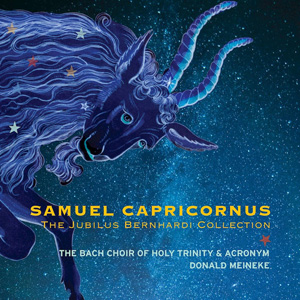You may not have heard of 17th-century composer Samuel Capricornus, born (1628) into a Lutheran family in what is today’s Czech Republic, and finishing his career (and life) 37 years later in Stuttgart, but if you enjoy music of that place and time, especially church music for voices and instruments, you should find that enjoyment enhanced by the enlightening program and performances on this recording.
Unfortunately the notes offer very little information about either composer or music, so if you’re more than just a little curious you will have to do some of your own research. In his early years as a musician, Capricornus (born Samuel Friedrich Bockshorn) worked in the court at Vienna and spent time in Bratislava before arriving in 1657 for what would be his final post, as Kapellmeister in Stuttgart. In his short career he wrote hundreds of works; most of those that survive are sacred choral pieces. Most strangely, the notes say even less regarding the music itself. What exactly is “the Jubilus Bernhardi”? A little investigative effort reveals that it is a collection–specifically motets–setting 24 spiritual texts by 12th-century French abbot Bernard of Clairvaux. (At least there is a separate booklet containing the texts and translations.)
Now that we have that out of the way, you can rest assured that the music itself, and the performances, are of consistently exceptional quality. The scoring is for “five soloists, five ripieno vocal parts, and a consort of violas da gamba with continuo”, and the resulting sound–especially with players and singers this good and well-chosen, ideally balanced and compatible in timbre–is thoroughly pleasant; you could even say it has a soothing quality as one motet sort of blends into the next. You hardly notice the transitions from one to another as there are no stark contrasts of mood or instrumentation, just an easy flow as voices alternate in different combinations, rhythms dance in varying degrees of complexity, melodies mingle, with harmonies always full and vibrant.
More than a few commentators have remarked that Capricornus’ church music serves as an important bridge from Schütz to Bach, and that is a fair assessment. Oh, and we also don’t get to know who the soloists are–all of the singers are listed together according to voice part (would it have been too much trouble to highlight the soloists with an asterisk?). But, as fine as these singers are, I have to give special mention to the outstanding bass soloist, whoever he is. In sum, a surprising discovery, well worth the two discs and nearly two hours of listening.
































